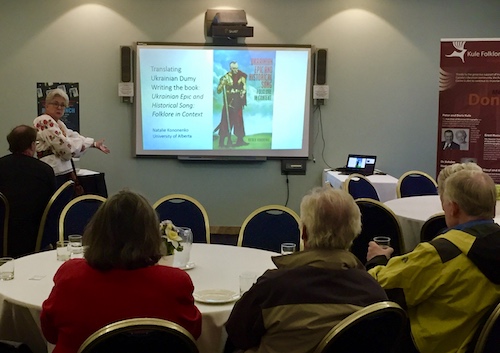
Natalie Kononenko presenting on her new book
The inaugural Kule Chair of Ukrainian Ethnography at the Kule Folklore Centre, University of Alberta since 2004, a collaborator on a book about the legacy of Peter and Doris Kule, the author of award-winning Ukrainian Minstrels: And the blind shall sing and the widely used Slavic Folklore: a Handbook, plus a contributor to other books on Ukrainian and Slavic folklore, Natalie Kononenko has added her latest book, Ukrainian Epic and Historical Song: Folklore in Context to her list of achievements.
Although she plans to retire from the University of Alberta at the end of this year, Natalie certainly won't stop working. Introducing her at her book launch on May 22nd, Jars Balan notes, "Nobody really retires from intellectual work." The interim director of the Canadian Institute of Ukrainian Studies since 2017, Balan has played a key role in supporting Natalie's work on Ukrainian folklore, especially the traditions of Ukrainian Canada. "Our folklore is very rich, so Natalie still has a lot to work on," he says playfully.
Kononenko's career has extended beyond academic research and publication. Carrie Smith, professor and Chair of the Department of Modern Languages and Cultural Studies, praises Kononenko's legacy as a writer and teacher: "She has brought name and renown to folklore studies at the University of Alberta." Known for her extremely popular classes, sometimes drawing over one hundred incredibly diverse students from various departments, Smith calls Kononenko "a powerhouse in teaching."
"No one teaches like Dr. Kononenko," she says proudly, "the students were engaged in the subject of folklore."
Fittingly, then, Kononenko's new book reaches beyond specialists in folklore and Ukrainian studies to be accessible to the Ukrainian community and those beyond. The launch of this latest project is well-attended by Edmonton's Ukrainian community, as people gather to learn more about their own heritage and share their stories. Explaining her work to the crowd, Kononenko says the book is significant both in Ukraine and to communities in diaspora, because epic gives people a sense of themselves as a nation.
Kononenko emphasizes that dumy are "a specifically and uniquely Ukrainian tradition," differing from the epics of Greece, Western Europe, or Asia. Presenting Ukrainian epic songs-dumy-in translation, with remarkable historical and cultural context, her work shows how these songs were relevant both at the time of their composition and later in Ukrainian history. As Dr. Kononenko was first involved in translating dumy as a graduate student, this publication is truly a career-spanning work, building on her past studies and the gradual development of scholarship in her field.
More than anything, Kononenko wants this work to be accessible. "[Folklore] is not a field based on statistics," she tells the group at the launch. "I'm a storyteller." And despite her upcoming retirement, this accomplishment surely won't be her last. As she says to one attendee, "I've got a lot of books planned, and I intend to keep on writing."
Ukrainian Epic and Historical Song: Folklore in Context is available for purchase from theUniversity of Toronto Press. For more information on Dr. Kononenko's current work on the Sanctuary Project, visit her website at the University of Alberta.